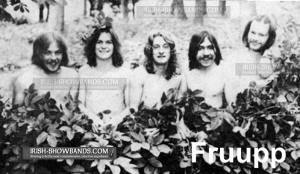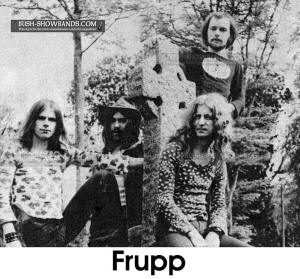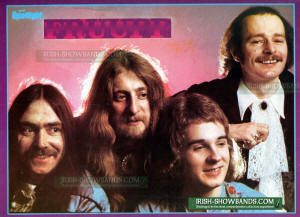Fruupp Photo Gallery (1971-1976)
Photo Gallery -
Band Lineups -
Discography
- Audio samples -
Where Are They Now?
The Story
 Fruupp started life as a heavy
rock group in either 1970 or 1971, we are not sure. Even members of
the band seem to have problems pinpointing the band's beginnings
although it is agreed that the name Fruupp was adapted by one of the
early lineups which featured Vincent McCusker. Contrary to stories
circulated about the name coming from a ghost in a rehearsal studio,
manager Paul Charles has admitted it came from a sheet of Electraset
letters in which the only remaining letters were F,R,U,and P. The
band added an extra U and P and FRUUPP was born.
Fruupp started life as a heavy
rock group in either 1970 or 1971, we are not sure. Even members of
the band seem to have problems pinpointing the band's beginnings
although it is agreed that the name Fruupp was adapted by one of the
early lineups which featured Vincent McCusker. Contrary to stories
circulated about the name coming from a ghost in a rehearsal studio,
manager Paul Charles has admitted it came from a sheet of Electraset
letters in which the only remaining letters were F,R,U,and P. The
band added an extra U and P and FRUUPP was born.
Vince left
Belfast to go to London in early 1971 to meet up with long time
friend and future manager, Paul Charles. In his absence, a variety of musicians
used the name Fruupp doing gigs. Apparently, Paul and Vincent had
hoped to put together a band to play in England, but when things did
not work out, Vincent returned to Belfast and formed the lineup
which
became Fruupp.
The first reference we can find to
the band is in the June 26th, 1971 issue of Spotlight
magazine in the Wee North column, written by Colin McLelland.
He reported that the band had gotten back together after breaking up
earlier in the year and added a new bass player and drummer. The
"new" lineup was: Miles McKee (aka Tinhead-vocals), Steve Houston (keyboards),
Vincent McCusker (guitar), Martin Foy(e) (drums) and Peter Farrelly
(bass).
Miles had been involved with
earlier lineups as had Vince. Steve was a classically trained
pianist and been part of the BBC Youth Orchestra before joining the
band (a decision not really appreciated by his parents we read).
Martin had been in several Northern showbands before ending up
playing drums with Fossett's Circus. Peter was a converted lead guitarist
who it was reported took the gig because the band's original music
would required a "lead" bass player.
The band had also changed it's
musical direction from heavy rock to what was described as "Fruupp
music" in the article. They were playing a mostly original set with
the majority of songs being written by Vince and Steve. Colin
reported that they would be making their debut in the Marquee Club
in London on July 23rd, but might play some Irish dates in advance
of that date. It is generally accepted that their first gig was July
21st in Belfast in support of Rory Gallagher. The band moved to
London and throughout the rest of 1971, they split their time
between London, Northern Ireland and Germany. They returned to
Ireland in December for some dates at home and in the South.
By late 1971, the band was down to
a four piece as lead singer Miles McKee had left the lineup just before
Christmas. Pat Egan reported seeing the band live on their first
tour of Ireland at Christmas (January 8th issue of
Spotlight). Although his review was good, he felt they were weak
on vocals and was hoping they would come down South more often.
As an aside, information on
Northern bands can be difficult to uncover as they were generally not
written about unless they were playing the Dublin scene on a regular
basis. News from the Northern Ireland was sporadic at best, partially
because Spotlight was mainly a Republic of Ireland publication and
partially because the troubles in the North played havoc with the
entertainment scene across the border.
 In early 1972, the band
again played support to Rory Gallagher in the Ulster Hall, one of the
country's biggest venues. In March, 1972, manager Paul
Charles reported the band was finally beginning to move from
supporting gigs to headlining some of the clubs they played. The
next mention of the band we can find is in Pat Egan's Beat column in
May, 1972 when he reported Fruupp were doing very well in London and
were, in fact, the only Irish band playing the English clubs at the
time (although we doubt this was strictly true). This was again
reported in August, 1972 in another article. In late May they played
with Skid Row in the Stadium in Dublin, although they were living
and working in London full time. 1972 saw the band continue their
pattern of mainly playing English gigs, but interspersed with
occasional trips home to Ireland and short tours in places like
Germany and Holland.
In early 1972, the band
again played support to Rory Gallagher in the Ulster Hall, one of the
country's biggest venues. In March, 1972, manager Paul
Charles reported the band was finally beginning to move from
supporting gigs to headlining some of the clubs they played. The
next mention of the band we can find is in Pat Egan's Beat column in
May, 1972 when he reported Fruupp were doing very well in London and
were, in fact, the only Irish band playing the English clubs at the
time (although we doubt this was strictly true). This was again
reported in August, 1972 in another article. In late May they played
with Skid Row in the Stadium in Dublin, although they were living
and working in London full time. 1972 saw the band continue their
pattern of mainly playing English gigs, but interspersed with
occasional trips home to Ireland and short tours in places like
Germany and Holland.
By 1973, the band was hitting its
stride and were prepared to record their first album. They hade a
very successful tour of Ireland but were still mainly playing the UK
and the Continent. Signed to a recording deal with the Dawn Records,
a subsidiary of the Pye label, they went into the studio to record the album in
July. In October, 1973, Future Legends was released. It contained
eight tracks, all written by Vince McCusker. It got mixed reviews
and did not sell well, but the band
would still go on to record three more albums. At Christmas, the BBC recorded one
of the band's concerts for their "Ireland's Eye" series.
In early 1974, Fruupp announced
plans for a second album and a change of producers. They reported
David Lewis, former member of Andwella's Dream, would be working
with them. Work on the new album was started in Kent. By late April,
the new album, entitled Seven Secrets, was completed and released on
the 19th. Plans were announced for a major Irish and English tour in
summer, 1974. It was to be called Fruupp's Midsummer Dream.
The band planned to promote the album as well as an extended stay in
a house in Clonmel, during which time they would be writing and
rehearsing material for a third album to be released later in the
year.
As the title implied, the new
album contained just seven tracks. Like other bands of the era, such
as Genesis, Fruupp were experimenting with influences as diverse as
jazz, classical and Irish traditional music. The results were longer
tracks which featured heavy instrumental passages. Unfortunately,
outside of their hometown, the band never really made it in Britain,
or Ireland. Later in the year, the band would release it's third
album, The Prince of Heaven's Eyes, which again would not
sell very well. They also released a single in October, Prince of
Darkness, this was followed up in December with The Prince of
Heaven single. Neither one did much in terms of sales or
airplays in Ireland.
 In
early 1975, founding member (and one of the main songwriters in the
band), Steve Houston, left and was replaced by John Mason, a
keyboard player who had previously played on the showband scene. An
article in Spotlight a few months later in mid 1975 entitled,
"Dark Horses Plod On" was a fairly pessimistic view of the band's
progress to that point.
In
early 1975, founding member (and one of the main songwriters in the
band), Steve Houston, left and was replaced by John Mason, a
keyboard player who had previously played on the showband scene. An
article in Spotlight a few months later in mid 1975 entitled,
"Dark Horses Plod On" was a fairly pessimistic view of the band's
progress to that point.
The article, written by Desmond Ilford,
reported that, "after all this time away from home - going on three
years - they have yet to make any real headway in Britain, and are
still very much in the second league as regards the rock stakes in
this country." However, the article praised the band
for the fine music they were producing and their success in Belfast where they were able
to sellout shows in large halls. The article ended with "fair dues
to them, they plod on regardless. May 1975 is their year. Maybe."
Sadly, it would not. They released
one more album, Modern Masquerades (1975) and within a year,
the band was gone, splitting up in 1976. We have read online that
their last gig was at the Roundhouse, London in September, 1976.
However, the story of Fruupp does
not end there. Unlike most Irish rock bands who came and went with
little notice, Fruupp's reputation seems to have only grown over the
ensuing 38 years. All four of their albums are still available and
have been re-released at several points in the 1990's and 2000's.
Steve Houston continues to maintain a website at www.fruupp.com.
There is also a site dedicated to the band at the UC Berkely College
of Environmental Design.
Talk of a reunion gig was revived
in the late 2000's, but apparently came to nothing. Fruupp are one
of those bands that appear to be enjoying a much greater popularity
in the modern age of the Internet than they did back in the gritty
70's when live gigs and vinyl were the only avenues open for fans to
hear their unique brand of music.
click on thumbnails for full image
